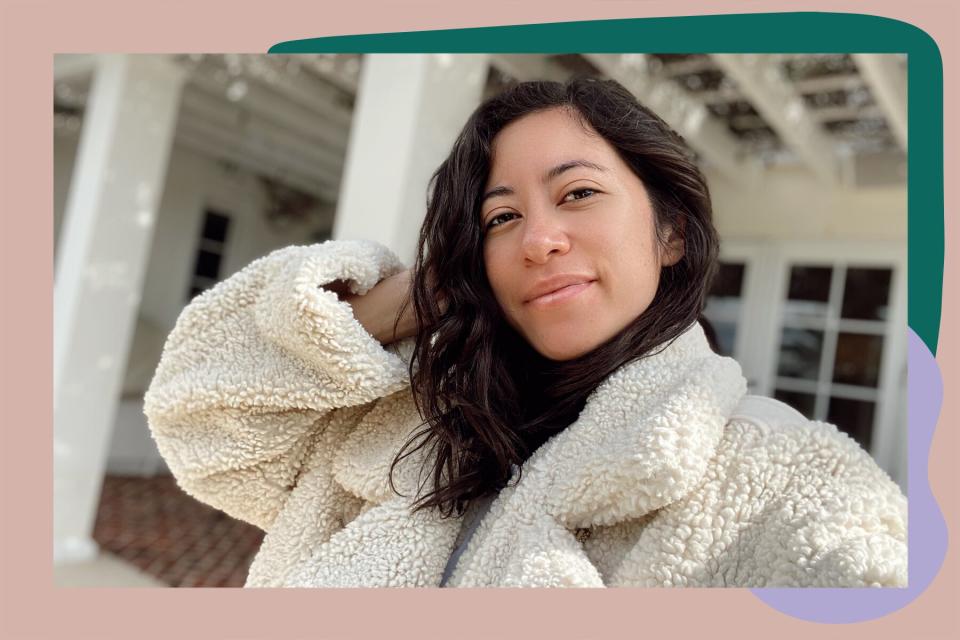As a Jewish-Asian, Learning To Love My Hair Was An Emotional Rollercoaster

Claire Stern, HelloGiggles
I can't begin to count the times I begged my mom to let me get a Japanese hair straightening treatment. If I had to guess, it would probably be in the hundreds, yet my efforts were to no avail. She was concerned that one day, I would change my mind and it would be too late to reverse the damage done to my hair. She was right, but it would be nearly a decade before I finally learned to appreciate my curls.
At my WASPy Westchester elementary school, the only socially acceptable hairstyle was pin-straight. I fit in and was perfectly coiffed until I turned 12 and puberty hit—my hair went from Posh Spice to Scary Spice faster than I could say "zig-a-zig-ah." Neat and tidy was out and a lion's mane was in, but not by anyone else's beauty standards. I loathed being different and felt intimidated by a new frontier of hair that I couldn't seem to comprehend, no matter how hard I tried.
The first signs of my burgeoning Jew-fro—a genetic heirloom from my Jewish dad—sprung up not-so-subtly around my bangs. With my hormones raging, I demanded answers, so I did what any confused young girl would do and asked my mom for help. (My dad's preferred hair care technique was to gel it into submission, which wasn't a viable option for my shoulder-length cut.) Though she's a woman of many talents, my mom is Asian and has only ever styled pin-straight hair, so dealing with my unruly mop that was the antithesis of hers was not among them. That's not to say we didn't try. Hairspray, curl cream, anti-frizz serum, you name it. Still, every time I went to my local salon for a haircut, I'd leave looking like a Christmas tree. Instead of layering and thinning the hair out, the stylist would keep the strands long, leaving my hair looking bulky and triangular. I spent my days sulking around the house and scoffed at my dad on a regular basis for bestowing his curly, out-of-control hair upon me.
My preferred styling method in the early aughts was to secure my curly face-framing bangs with butterfly clips, one on each side of my face, and tuck the strands into my straight hair. In middle school, I would tie my hair back into a low ponytail when I didn't fry it with a flat iron, usually before teen dances. As the only Jewish-Asian in the entire town, my hair made me feel like an almost-outcast and I desperately wanted to look the same as everyone else. At the time, I didn't realize that my perspective was narrow-minded—nobody cared to think about why straight hair seemed to reign supreme, as opposed to other textures and styles.
Learning to love my hair was an emotional rollercoaster.
The ups were few and far between, and the downs were brutal. At sleepovers, my friends would swap stories about each other's hair that I couldn't remotely relate to. My braids were messy and unkempt; theirs always appeared pristine. During the summer months, I'd avoid putting my head underwater in the pool, lest my straightened tresses get wet and wild. It wasn't just the hair either. After school, the bulk of my classmates would attend religion classes at the Confraternity of Christian Doctrine and I'd go home—curly hair in tow—and watch TV by myself.
Ultimately, I left my hometown and went to college in New York City, a quick train ride away but another world in terms of diversity, particularly with regard to hairstyles. I made friends with other Jews who embraced their natural locks and, more importantly, knew how to cut and care for them. My extracurricular activity became discovering the virtues of silk pillowcases, how sleeping in a loose bun can mitigate frizz, and why it's essential to request short layers and thinning from stylists (shout-out to Spoke & Weal for giving me my first proper haircut). I'll never forget the state of euphoria I entered when I left the salon that fateful day, and later, in the shower, when I felt the full weight of my thick hair had been miraculously lifted.
Now, two decades past puberty, slightly more mature and content with who I am, I hardly ever straighten my hair. Instead, I opt to wear it natural as often as possible. What's more, a lot of people I know who got Japanese-style chemical straightening ruined their curls permanently in the process. Despite all my adolescent angst, I'm eternally grateful that my mom shut down my pleas for Japanese straightening. As the Jews say, it was bashert (that's Yiddish for "meant to be").

 Yahoo Movies
Yahoo Movies 